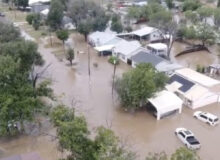This column is published only here, rather than being a re-link of one published elsewhere. This is the full column. Please share it with your congressmen. — Quin
Congress quickly ought to pass a law officially designating all coronavirus-related illness and death an “act of God” for lawsuit purposes, exempting all people and organizations from liability for the spread of the disease.
Right now, it is almost certain that decisions on whether to close or suspend places or events are being made as much on the basis of legal liability as on the actual best interests of public health. It is quite arguable, for example, that the virus will be less likely to spread, especially among vulnerable populations, if college campuses remain open than if they close. But, as one university administrator told me, almost all colleges are suspending classes and sending students home in large part because if the students get sick while on campus, the college is “responsible,” but not if the students get sick elsewhere.
Likewise, once the PGA Tour started its Players Championship last week and then made a decision to keep playing without fans, it made no sense not to finish the tournament. Few places in the world are safer than the wide-open expanse of a golf course without fans. The players and caddies are less likely to be at risk in their five hours on course than they are when back in their hotels. Once the players were at the tournament anyway, why not play, and then cancel only the subsequent events so the players aren’t asked to put themselves at risk through travel?
Yet as golf analyst Brandel Chamblee said when the PGA changed its mind and cancelled the rest of the tournament altogether, it was the most practical decision because “you can’t help but consider the legal ramifications.”
To be clear, I’m not making the argument that all or any cancellations (except for the Tour Championship) are necessarily wrongheaded, but only that all such decisions should be made on the basis of the best information on health ramifications, not legal considerations. And, as all of this is so new to everybody, institutions are relegated to making their best educated guesses in consultation with health authorities, so it would be terribly unfair to leave them liable for the results of what turn out to be mistaken guesses.

If a college’s students already have returned from spring break and the college is in a rural area where the virus hasn’t yet hit, and if the semi-closed environment of the campus would be seen by public health officials as a safer place for most students than their hometowns or than the travel required to return to those hometowns, then, darn it, those campuses shouldn’t close merely because they fear lawsuits based on someone getting sick while on campus.
Plus, some closures or cancellations could end up endangering public health by their second-degree effects. It’s easy to envision supply chains being disrupted because the closure of x leads to the unavailability of y and z. Well, if either y or z is necessary for health or hygiene, then the cancellation upstream in the name of public health would actually have endangered public health downstream. The legal system is not well equipped to handle such complicated considerations in tort lawsuits, but unless Congress acts as I suggest, it is almost certain that plaintiffs’ lawyers will be looking to capitalize once the pandemic has faded.
Taking potential lawsuits out of the equation will allow wiser decision-making rather than cover-one’s-rear-end choices.
In the name of the public weal, then – both for health and for a sound economy – Congress should act. Pass a national liability exemption for the coronavirus, and pass it now.






